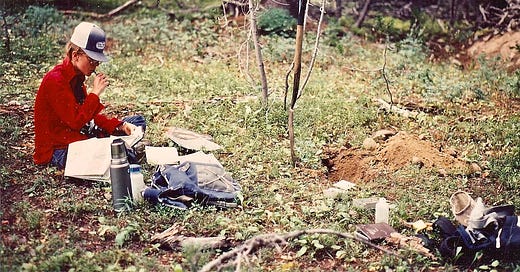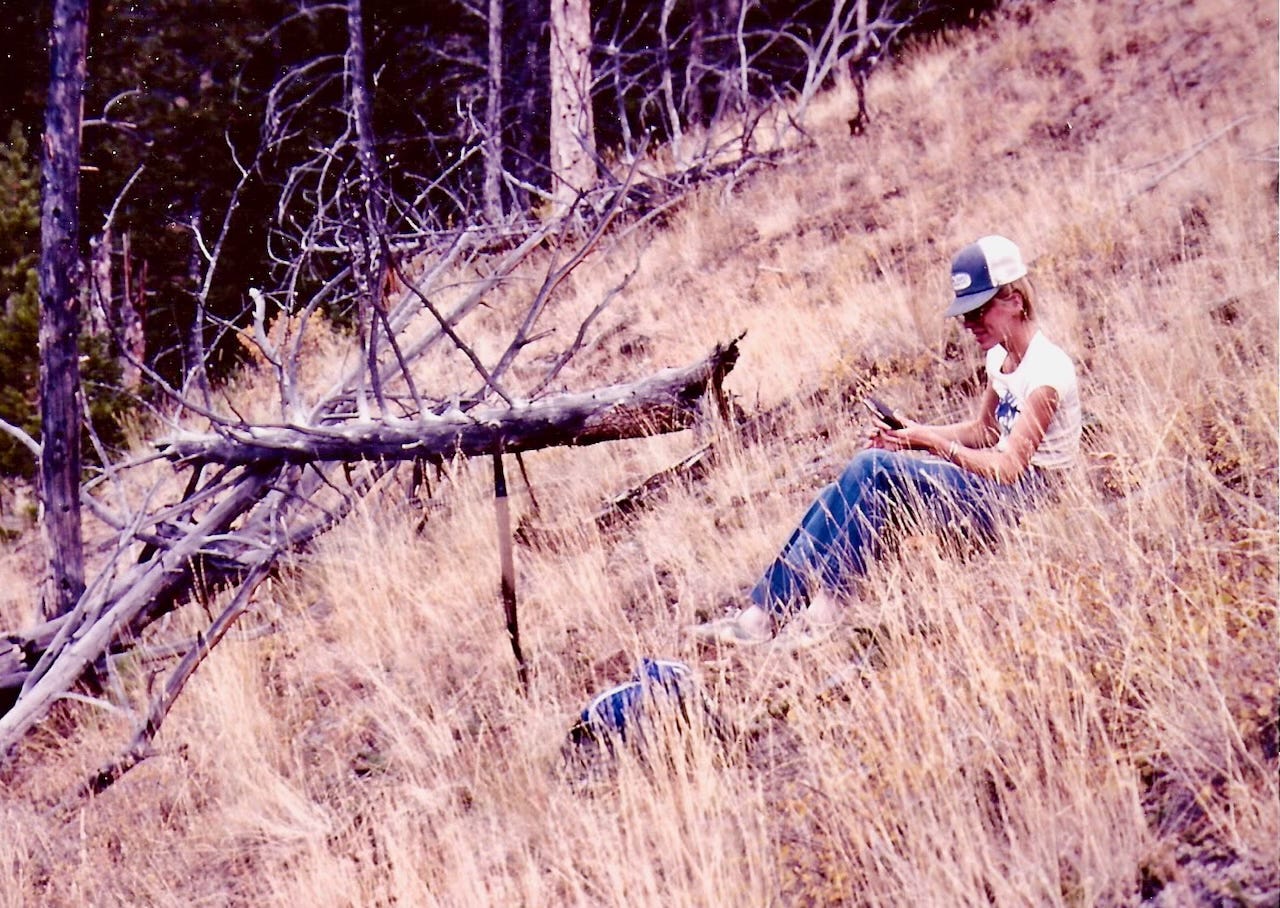Hello, Friends,
I am writing you today because I am sad and angry. In the past two months, an estimated 3,400 employees of the US Forest Service and 2,300 US Department of Interior employees (including 1,000 National Park Service staff) have been fired. That’s on top of thousands more (2,700 in the Interior Department alone) who resigned following Elon Musk’s infamous “fork in the road” memo encouraging them to leave immediately rather than be fired later.
I was once one of these employees.
The photo above of the slender red-head with her waist-length hair stuffed into a ball cap, sitting by a soil pit in the woods is me more than 45 years ago as a young field scientist working for the US Forest Service. My job was to map and describe the habitat types of the Shoshone National Forest in Wyoming. America’s first national forest forms the eastern edge of the Greater Yellowstone Ecosystem, home to grizzly bears and hot springs, rugged mountain plateaus and more types of big sagebrush than anywhere else I know.
From May through September, I spent my days outdoors on the 2.4-million-acre National Forest, which stretches from the Montana border to South Pass in southern Wyoming, describing the plant communities and what they tell us about wildlife habitat, forest potential, grassland and shrubland health and recreation management. Giving the forest managers a detailed picture of the nature of the land they were responsible for.
During field season, I worked 10 days “on” and four days “off.” My work involved miles of hiking, horse-packing and backpacking to get to remote parts of the National Forest, and camping out more often than not.
I lost weight each field season because I simply could not eat enough to make up for the calories I was expending (but I was in great shape!). Out in the field, my work days ran from sunrise to sunset. During the off-season, when I was based in town, I worked a second job as a waitress so I could afford to live on my skimpy USFS salary.
Mine wasn’t a cushy federal government job. Yet I loved every moment of it; so did most of my colleagues. We considered ourselves fortunate to work outdoors on the land we loved—the land that belongs to all of us—helping care for these incomparable public spaces with their rich scenery, history and biodiversity.
I Am Angry
We are losing an incredibly valuable resource in these federal employees. They are scientists like me collecting the basic data that allows us to manage our public lands and cultural heritage sites sustainably.
They are rangers enforcing the law and keeping these places from being vandalized and degraded. They are interpreters teaching visitors—our kids, our families, tourists from other places—about our heritage.
They are the people who manage volunteers, maintain roads and campgrounds, clean toilets and empty trash cans, build trails and boat docks and overlooks. They are natural resources conservation folks who help farmers conserve water, use less chemicals, and plant pollinator strips to nurture butterflies and native bees.
Like me, they chose jobs that pay less than the private sector, where the hours are long and the housing may be substandard, because they wanted to work to protect our nation’s incomparable public lands and heritage sites. They deserve better than this, and so do we.
What Can We Do?
Call your senators and representatives and express your outrage about losing these employees and all they do. Five Calls helps locate their phone numbers, plus offers scripts to get you thinking about what to say.
Encourage your state government senators and representatives to speak up, and at the very least, to streamline the hiring process and offer former federal employees positions with the state. Governors and state officials in New York, Maryland, Pennsylvania, Virginia, New Mexico and Hawaii are already encouraging federal employees to fill long-term vacancies in their states.
Join or follow the organizations and online communities springing up to support federal land management employees like Public Lands Foundation which is specifically aimed at the Bureau of Land Management, and Resistance Rangers, an Instagram community organizing National Park Service rangers and other staff.
Donate to the Community Guardian Fund, established to support public land employees through direct funding through PayPal (@communityguardian)
Volunteer at public lands and heritage sites: Pick up trash, help maintain a trail, staff an information desk, monitor a campground. A few hours a week could make a difference between a site being open and cared for and not.
Thank you, and many blessings to you all,
Susan







Thank you, Susan, for delineating the steps we can take to protest the devastation this administration is creating. And it’s everywhere. But the little bit of natural beauty and wildlife that we have left is so important to preserve. It always seems last on the list (sigh).
Susan, thank you for sharing your story, photos, and unwavering passion for protecting public lands - it's incredibly inspiring! The loss of these dedicated employees is deeply heart-breaking, and I completely share your anger and frustration over the toll it takes on both the people and the lands they cherish. Thank you for the actionable steps you’ve outlined; I hope they encourage many, many others to rally behind this critical cause.